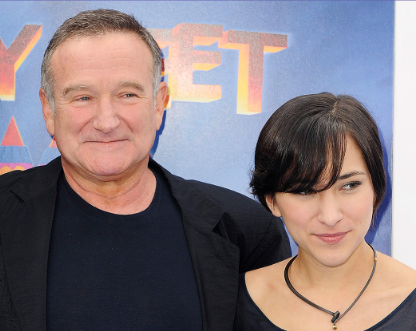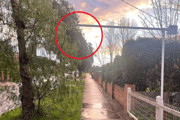
When someone you love passes away, the memory they leave behind becomes sacred.
Now imagine strangers using artificial intelligence to make your deceased father 'speak' words he never said and perform in ways he never agreed to.
For Zelda Williams, daughter of comedian Robin Williams, this disturbing scenario became a painful reality.
Zelda took to Instagram on 8 October to voice her distress over AI-generated videos of her late father.
'Please, just stop sending me AI videos of Dad. Stop believing I wanna see it or that I'll understand, I don't and I won't,' she wrote.
The post resonated with fans of Mrs Doubtfire, Good Will Hunting, and Dead Poets Society, but for Zelda, these recreations were more than digital novelty—they were deeply upsetting.
'To watch the legacies of real people be condensed down to 'this vaguely looks and sounds like them so that's enough', just so other people can churn out horrible TikTok slop puppeteering them is maddening,' Zelda continued.
She criticised the technology sharply, calling it 'the Human Centipede of content' and likening it to 'badly recycling and regurgitating the past to be re-consumed'.
'You're not making art, you're making disgusting, over-processed hotdogs out of the lives of human beings.'
AI deepfakes work by analysing thousands of images and video clips of a person to recreate their voice, facial movements, and mannerisms.
The recent surge in Robin Williams deepfakes followed the release of OpenAI's text-to-video model, Sora 2, which promises more realistic results but has drawn criticism for bypassing consent.
Free-to-use generative AI apps have made creating such videos accessible to anyone, raising ethical concerns about consent and exploitation.
Zelda has faced online cruelty before—shortly after her father’s death by suicide in August 2014, she quit Twitter due to trolling and manipulated images of Robin Williams.
During the 2023 Hollywood actors’ strike, she warned, 'I've witnessed for YEARS how many people want to train these models to create/recreate actors who cannot consent, like Dad. This isn't theoretical, it is very very real.'
Understanding AI deepfakes
AI deepfakes are created by feeding computer programs thousands of images and video clips of a person.
The AI learns to mimic their appearance, voice, and mannerisms, then can generate new content showing them saying or doing things they never actually did.
While the technology has legitimate uses in film and education, it's increasingly being misused to create false content of celebrities, politicians, and ordinary people without their consent.
Hollywood has also confronted the rise of AI performers
Last month, an AI character called Tilly Norwood debuted at the Zurich Film Festival as Hollywood’s first 'AI actor', created by Eline Van der Velden and intended for a talent agency contract.
The Screen Actors Guild-AFTRA condemned the development: 'To be clear, 'Tilly Norwood' is not an actor, it's a character generated by a computer program that was trained on the work of countless professional performers—without permission or compensation.'
Stars including Emily Blunt and Whoopi Goldberg supported the union, with Blunt saying on a podcast, 'Please stop taking away our human connection.'
For families like the Williams, AI deepfakes reduce beloved individuals to digital puppets, erasing the humanity behind their work.
'I've already heard AI used to get his 'voice' to say whatever people want and while I find it personally disturbing, the ramifications go far beyond my own feelings. Living actors deserve a chance to create characters with their choices, to voice cartoons, to put their HUMAN effort and time into the pursuit of performance,' Zelda wrote.
Signs that a video might be AI-generated include unnatural facial movements, slightly robotic voices, content that is out of character, accounts known for AI videos, and recent 'interviews' from people who have passed away.
The safest response is to avoid sharing, commenting on, or forwarding such content—especially to grieving families.
Protecting digital dignity
- AI deepfakes can cause real emotional harm to families of the deceased
- The technology is becoming more accessible and harder to detect
- Sharing or creating such content without consent is ethically questionable
- The entertainment industry is fighting to protect human performers—simple decency suggests avoiding content that exploits the dead
Zelda’s plea is simple: treat others with the respect you would want for your own loved ones.
'If you've got any decency, just stop doing this to him and to me, to everyone even, full stop. It's dumb, it's a waste of time and energy, and believe me, it's NOT what he'd want.'
As technology advances, the question is not whether we can recreate the dead—but whether we should.
What This Means For You
AI deepfakes of deceased celebrities can cause real emotional harm to their families, turning memories into digital content without consent. Free generative AI apps have made creating these videos accessible to anyone, making it easier for people to unknowingly or carelessly contribute to the problem.
Hollywood unions are actively challenging the use of AI actors trained without permission, highlighting the broader ethical concerns surrounding this technology. By exercising simple decency and avoiding sharing or engaging with these videos, we can respect both the deceased and their loved ones.
For viewers, this means pausing before clicking, sharing, or forwarding content online—choosing compassion over clicks helps protect the dignity of those who are no longer with us.
The rise of AI deepfakes isn’t limited to celebrities—it can also affect ordinary people in deeply personal ways.
From manipulated videos to fake images, technology is increasingly being used without consent, raising serious ethical and legal questions.
For a closer look at how governments are responding to AI-generated content and protecting individuals, check out this related story.
Read more: Worried about AI creating fake nudes of real people? The government is finally taking action
Robin Williams’ daughter asks fans to stop sending her 'gross' AI-generated videos of the late actor — ITV News reports that Zelda Williams pleaded for people to stop sending her AI-generated videos of her late father, calling them distressing and disrespectful.
[https://www.itv.com/news/2025-10-0...-out-at-ai-generated-videos-of-the-late-actor(https://www.itv.com/news/2025-10-07...-ai-generated-videos-of-the-late-actor[/URL)]
Robin Williams’ Daughter Slams Fans Making 'Gross' AI Videos of Dad — The Hollywood Reporter details Zelda’s criticism of AI recreations, describing them as ‘TikTok slop’ and likening the practice to recycling the past in disturbing ways.
[https://www.hollywoodreporter.com/...er-slams-fans-gross-ai-videos-dad-1236394553/(https://www.hollywoodreporter.com/n...s-fans-gross-ai-videos-dad-1236394553/[/URL)]
Robin Williams’ Daughter Tells Fans to ‘Stop Sending Me AI Videos of Dad’: It’s ‘Gross’ and ‘Not What He’d Want’ — Variety expands on Zelda’s comments, highlighting her frustration at people recreating her father without consent and her support for striking Hollywood unions.
[https://variety.com/2025/film/news/robin-williams-daughter-ai-recreations-gross-1236541633/(https://variety.com/2025/film/news/robin-williams-daughter-ai-recreations-gross-1236541633/[/URL)]
Daughter of Robin Williams calls AI videos of late actor 'disgusting' amid generative AI Wild West — CBC News reports on the timing of the AI deepfake surge following the release of OpenAI’s new text-to-video model, Sora 2.
[https://www.cbc.ca/news/entertainment/gen-ai-zelda-robin-williams-1.7653514(https://www.cbc.ca/news/entertainment/gen-ai-zelda-robin-williams-1.7653514[/URL)]
Robin Williams’ daughter slams those ‘puppeteering’ him with AI online — Global News covers Zelda’s condemnation of AI actors like ‘Tilly Norwood’, and SAG-AFTRA’s response defending human creativity in the entertainment industry.
[https://globalnews.ca/news/11468179/zelda-williams-criticizes-ai-videos-of-her-dad-robin-williams/(https://globalnews.ca/news/11468179...s-ai-videos-of-her-dad-robin-williams/[/URL)]
Have you ever encountered AI videos of someone who has passed away, and how did it make you feel?







